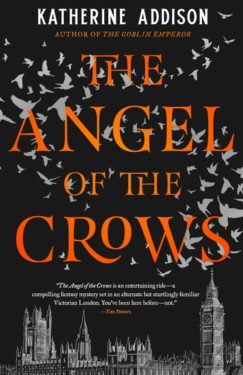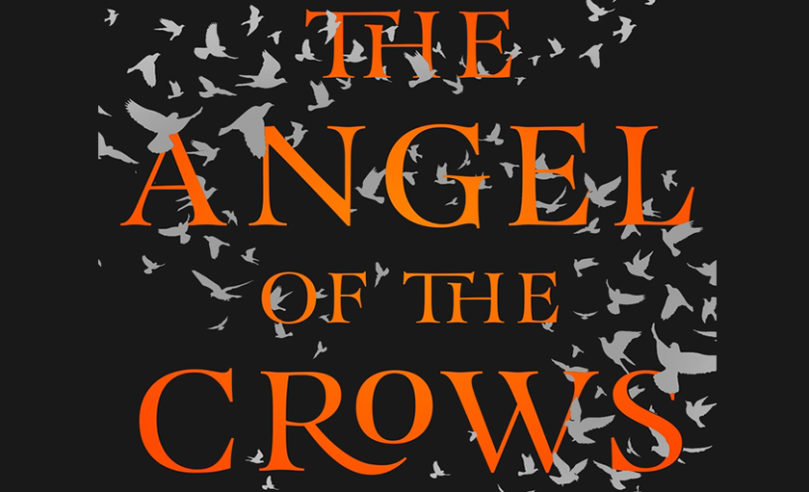 Katherine Addison, author of The Goblin Emperor, returns with The Angel of the Crows, a fantasy novel of alternate 1880s London, where killers stalk the night and the ultimate power is naming.
Katherine Addison, author of The Goblin Emperor, returns with The Angel of the Crows, a fantasy novel of alternate 1880s London, where killers stalk the night and the ultimate power is naming.
This is not the story you think it is. These are not the characters you think they are. This is not the book you are expecting.
In an alternate 1880s London, angels inhabit every public building, and vampires and werewolves walk the streets with human beings in a well-regulated truce. A fantastic utopia, except for a few things: Angels can Fall, and that Fall is like a nuclear bomb in both the physical and metaphysical worlds. And human beings remain human, with all their kindness and greed and passions and murderous intent.
Jack the Ripper stalks the streets of this London too. But this London has an Angel. The Angel of the Crows.
Please enjoy this excerpt of The Angel of the Crows, on sale 06/23/2020.
Chapter 1
The Exile’s Reluctant Return
When I left London in 1878, I intended never to return. I had my medical degree and a commission in Her Majesty’s Imperial Armed Forces Medical Corps. If I died on the plains of Afghanistan in the service of my Queen, I would ask for nothing better. And if I did not die and somehow the war with Russia ended, one great truth of the world is that there is always need for doctors, whether you are in England, India, or Brazil. I could go wherever I pleased and be sure of earning a living.
The possibility that did not occur to me was that I would neither die nor see the end of the war. In May of 1888, a convoy of which I was part was ambushed in a narrow defile near Kandahar. Two Afghani Fallen led the charge, and in my attempt to defend my patients, I took a blow that broke my left femur in two places and missed severing my femoral artery by only a fraction of an inch.
I should have died—as I had always expected to—and been torn apart by the Fallen’s monstrous claws, if it had not been for my faithful orderly Murray, who flung me across a pack mule and thus ensured that I was part of the retreat and not part of the carnage left behind. It was a long time before I was able to be grateful to him.
I was fortunate again: the nearest hospital happened to be under the direction of Dr. Ernest Sylvester, who has become famous in recent years for his theories about spectral injuries. Anyone else would have amputated my left leg and I would have died, as soldiers were dying throughout Persia. But Dr. Sylvester set the bone and cleaned my wounds with salt and silver, and I survived.
I was racked with fever after fever, the Fallen’s poison festering and erupting in my body like malignant flowers. Dr. Sylvester’s hospital was too small and too new—and withal too flimsy, being mostly flapping canvas and filthy straw—to have acquired an angel, and I was far too ill to survive transport to Scutari. I was healed with silver and salt and well-wishing from every doctor, nurse, and patient who knew how. Word spread, and when I finally woke clearheaded, my bed was surrounded by tokens from (it seemed) every soldier in Afghanistan.
“There are many people who have reason to be grateful to you, Dr. Doyle,” Dr. Sylvester said, after a particularly trying and bitter interview with my superiors, and I endeavored to remember that; endeavored—with greater or lesser success—to remember that I had done good work, saved lives.
Was being shipped home a useless cripple.
Pack mule overland, rusty steamer to Istanbul. Another week in Scutari with a relapse—the young doctor there was very intrigued by the infected matter he drained from the raking wounds in my thigh, and I told him, wearily, to write to Dr. Sylvester with his questions. The Angel of Scutari I saw only from a distance. She walked among the dying men, who needed her comfort most. I was not dying, and there is nothing—not hell-hounds, not even demons— angels fear so much as the Fallen, their own murderous kin.
When finally I was deemed strong enough for the journey to England, I was almost glad of it, for it is agonizing to be on the edge of a war in which you are forbidden to fight. My paltry belongings and I were packed on the air-barque Sophy Anderson, and we began the three-day journey home—I had never developed the Raj habit of audibly capitalizing the H, and I certainly did not feel it now, surrounded by civilian businessmen with soft hands and fishy eyes. England was not my home, and I only wished I knew where home might be.
I was still so depleted that I slept something like sixteen or eighteen hours in the twenty-four, but not even a stone could have slept the last leg of the journey, from Paris to London; the unpleasant assortment of businessmen and invalids was increased by two North American Colonials. One, a giant, ugly bull of a man, was drunk when they boarded, but he bothered me less than his companion, who was cold-eyed and watchful in the manner of a man who dug voraciously for others’ secrets because he was hiding so many of his own.
The drunken bull made a beeline for the only young woman among the passengers, the daughter of one of the businessmen; she had spent the past two years (I had learned from the inevitably overheard conversations) keeping house for her father in Athens. I had noticed her because she seemed another for whom England was not Home with a capital H. I had seen her in the Athens Eleftherion on Lykavittos, saying tearful and animated farewells in demotic Greek to a stout henna-haired lady whom I guessed to be the housekeeper. I had seen no such vivacity from her since; she sat silently by one of the tiny portholed windows, staring out at whatever there was to be seen and ignoring her father talking shop beside her.
The American took the unfortunately vacant seat across from her and announced, in a voice loud enough that they probably heard him at the base of M. Eiffel’s ridiculous and majestic moor- ing tower, that he was Enoch J. Drebber of Salt Lake City, Deseret, and he was very pleased to make her acquaintance. The emphasis he put on “very” was obscene.
“And I to make yours,” she said with the cold politeness that was only one step removed from How dare you.
I could have told her it was no use. Even if Enoch J. Drebber of Salt Lake City, Deseret, would have heeded that cue sober—a matter which was frankly open to doubt—he was roaring drunk. He merely leaned in a little closer and began talking in a much softer voice, a voice too low to carry at all. The young lady’s father had descended to the tower’s café for—no doubt—a quick cognac, and the other American, who might have been hoped to provide a curb to his friend’s objectionable behavior, merely offered a pale, chilly smile and wandered away to the other end of the cabin.
I did not want to care. I was exhausted and feverish, and my leg ached with a dull, endless throbbing that no position I tried seemed to ameliorate. I wanted to go back to sleep and be free of my body until we reached London. But from where I sat, I had a perfect view of the growing distress on the young lady’s face, and when Enoch J. Drebber leaned forward and, with the suddenness of a snapping pike, caught her hand in his ham-hock-sized paws, I saw her gasp and her futile attempt to draw back, and I could abide it no longer. I heaved myself to my feet and said, loudly enough to carry through the entire cabin, “Sir, I must ask you to unhand the young lady.”
The abrupt quiet was exactly what I wanted. If nothing else, the other passengers would be made aware that there was a lady in need of protection, and one of them might—although I would not stake any large sum of money on it—have the fortitude to pick up the cudgels if I failed.
My immediate goal was achieved. Mr. Drebber released the young lady in order to stand up and snarl at me. “And what business is it of yours, sir, if the lady and I wish to have the pleasure of a few moments’ conversation?”
“None,” I said amiably, “if that is indeed what the lady wishes.”
He was not so drunk that he did not know just how strongly the lady had been wishing him at perdition. He scowled, an expression all the uglier for how naturally it seemed to fit his face, and said, “I still don’t see what call you’ve got to go nosey parkering around in my business, Mister—”
“Dr. J. H. Doyle,” I said, “late of Her Majesty’s Imperial Armed Forces Medical Corps. I wouldn’t give a halfpenny for your business, Mr. Drebber, but I think you should find a seat somewhere else.”
“Eavesdropping, were you?” he said, scowl metamorphosing to sneer. “Jealous, huh? Lady not interested in a cripple?”
“It can hardly be eavesdropping when you bellowed your name loudly enough for the entire cabin to hear.”
Mr. Drebber took a step forward, and suddenly his friend, who had cared nothing for the lady’s distress, was there, deftly insinuating himself into the aisle between Mr. Drebber and me, murmuring pale, cold phrases about “nothing regrettable” and “no rash gestures” with the polish and fluency of a man who had done the same thing many times before. But, for no reason that I could see, Mr. Drebber took the intercession in extremely poor part, shouting that he’d brook interference from no man living; he advanced into the aisle, shouldering his friend aside, and swung one massive fist in a ponderous haymaker.
I had to lean back only slightly to dodge, which also happily put my weight on my good leg. I swung the end of my cane in a neat sharp arc, striking solidly upon the inner condule of Mr. Drebber’s forward ankle. His howl of agony was remarkably satisfying, as was the way he fell to the floor, clutching his wounded appendage and promising me the fiery torments of Hell. His friend, eyes suddenly awake, began to make threats about legal action and lawsuits, a higher-pitched contrapunto to Mr. Drebber’s more sulfurous imaginings. I said, “It is no more than a bruise, sir. Please help your friend to someplace where he will not be blocking the aisle.” I gave the young lady a meaningful glance and added, “I fear he is upsetting the lady.”
I do not know whether she had ever had occasion to practice that sort of mendacity before, but she played up gamely, saying promptly—and perhaps not untruthfully, judging by her color— “Indeed, I am feeling a little faint.”
The American’s sharp-featured face for a moment indicated his profound hatred for all of us, including Mr. Drebber. But cabin stewards were starting to appear, drawn by Enoch J. Drebber’s continuing howls, and he knew as well as I did how the story was going to look when all the participants and witnesses were interrogated. He and I awkwardly maneuvered past each other, he hampered by Drebber’s uncooperative bulk and I by my cane and untrustworthy leg, and at the moment we were closest to each other, he caught my gaze and said, softly, “My name is Joseph Stangerson, Dr. Doyle. When you hear it again, I want you to remember who I am.”
It was an oddly elegant threat. I said, “No fear of my forgetting, Mr. Stangerson,” and then we had edged past each other and the moment was mercifully gone.
I sat down in Drebber’s vacated seat and said to the young lady, “Are you all right?”
She had her color back, in the form of a blush dark enough to make my face hurt in sympathy. She said, “I am fine. But I must thank you for . . .”
“You needn’t,” I said. “I did not act in order to earn your gratitude.”
She was pretty enough (and no doubt wealthy enough) that this puzzled her for a moment, but then her face relaxed into a more genuine smile. “I see,” she said. “You are a preux chevalier.”
“Sans peur et sans reproche,” I said, and although I intended the words lightly, they emerged with unexpected bitterness.
She drew back a little. I could not tell whether she was offended or frightened, and I did not care. The access of anger and the sharp addictive thrill of a fight, which had carried me this far, were draining out of me. I was aware again that my leg ached abominably, and the combination of fever and fatigue was beginning to make me light-headed.
Finally, well behind the fair, a steward reached us. “Are you all right, miss? Sir?”
“I am fine, thank you,” said the young lady, “but I fear Dr. Doyle is not well. Is there somewhere he could rest until we reach London?” I should have been angry at her for being interfering and highhanded, but I didn’t have the strength for that, either. I barely had the strength to say, “Really, I’m all right. I’ve mastered the trick of sleeping in these seats.”
“You’d be better off lying down,” said the young lady, and the steward was clearly no more deceived than she was, for he said, “There’s a bunk in the back, for the night watchman. You’re more than welcome to the use of it, Dr. Doyle.”
There seemed no point in continuing to deny that what I wanted most in the world was to lie down. I allowed the steward to escort me into the back of the cabin, behind the swinging port-holed door that protected passengers from crew and vice versa. I started to say, Wake me if there’s need, before I remembered that I was no longer an Armed Forces surgeon. I fell asleep on the Sophy Anderson’s narrow bunk, and when I woke, we were in London, safely moored at the elaborate and ominous spires of Victoria’s Needle, which had still been under construction when I had left the city ten years before.
Copyright © 2020 by Katherine Addison












Interesting! Angels and airships. Steampunk and the supernatural. Another for my TBR stack.